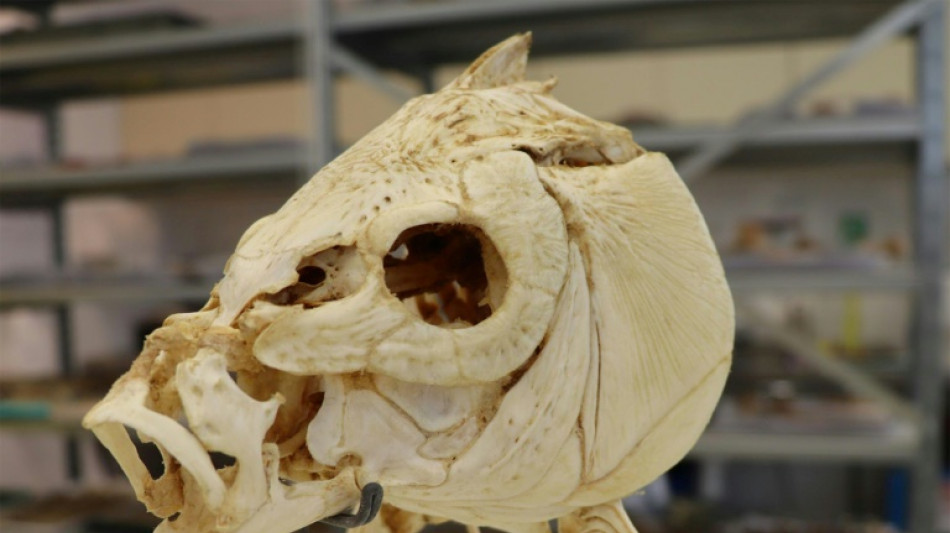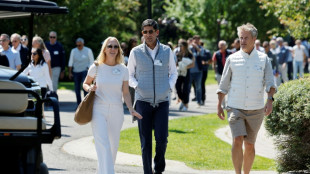
-
 Dutch PM-elect Jetten says not yet time to talk to Putin
Dutch PM-elect Jetten says not yet time to talk to Putin
-
Social media fuels surge in UK men seeking testosterone jabs

-
 Forest face Fenerbahce, Celtic draw Stuttgart in Europa League play-offs
Forest face Fenerbahce, Celtic draw Stuttgart in Europa League play-offs
-
US speed queen Vonn crashes at Crans-Montana, one week before Olympics

-
 Trump nominates former US Fed official as next central bank chief
Trump nominates former US Fed official as next central bank chief
-
New Dutch government pledges ongoing Ukraine support

-
 Newcastle still coping with fallout from Isak exit, says Howe
Newcastle still coping with fallout from Isak exit, says Howe
-
Chad, France eye economic cooperation as they reset strained ties

-
 Real Madrid to play Benfica, PSG face Monaco in Champions League play-offs
Real Madrid to play Benfica, PSG face Monaco in Champions League play-offs
-
Everton winger Grealish set to miss rest of season in World Cup blow

-
 Trump brands Minneapolis nurse killed by federal agents an 'agitator'
Trump brands Minneapolis nurse killed by federal agents an 'agitator'
-
Arteta focuses on the positives despite Arsenal stumble

-
 Fijian Drua sign France international back Vakatawa
Fijian Drua sign France international back Vakatawa
-
Kevin Warsh, a former Fed 'hawk' now in tune with Trump

-
 Zverev rails at Alcaraz timeout in 'one of the best battles ever'
Zverev rails at Alcaraz timeout in 'one of the best battles ever'
-
Turkey leads Iran diplomatic push as Trump softens strike threat

-
 Zelensky backs energy ceasefire, Russia bombs Ukraine despite Trump intervention
Zelensky backs energy ceasefire, Russia bombs Ukraine despite Trump intervention
-
'Superman' Li Ka-shing, Hong Kong billionaire behind Panama ports deal

-
 Skiing great Lindsey Vonn crashes at Crans-Montana, one week before Olympics
Skiing great Lindsey Vonn crashes at Crans-Montana, one week before Olympics
-
Slot warns Liverpool 'can't afford mistakes' in top-four scrap

-
 Paris show by late Martin Parr views his photos through political lens
Paris show by late Martin Parr views his photos through political lens
-
Artist chains up thrashing robot dog to expose AI fears

-
 Alcaraz outlasts Zverev in epic to reach maiden Australian Open final
Alcaraz outlasts Zverev in epic to reach maiden Australian Open final
-
French PM forces final budget through parliament

-
 French-Nigerian artists team up to craft future hits
French-Nigerian artists team up to craft future hits
-
Dutch watchdog launches Roblox probe over 'risks to children'

-
 Trump brands Minneapolis nurse shot dead by federal agents an 'agitator'
Trump brands Minneapolis nurse shot dead by federal agents an 'agitator'
-
Israel says killed 'three terrorists' in Gaza

-
 After Trump-fueled brawls, Canada-US renew Olympic hockey rivalry
After Trump-fueled brawls, Canada-US renew Olympic hockey rivalry
-
Eileen Gu - Olympic champion who bestrides rivals US, China

-
 Trump, first lady attend premier of multimillion-dollar 'Melania' documentary
Trump, first lady attend premier of multimillion-dollar 'Melania' documentary
-
US Senate eyes funding deal vote as government shutdown looms

-
 Cuddly Olympics mascot facing life or death struggle in the wild
Cuddly Olympics mascot facing life or death struggle in the wild
-
UK schoolgirl game character Amelia co-opted by far-right

-
 Anger as bid to ramp up Malaysia's football fortunes backfires
Anger as bid to ramp up Malaysia's football fortunes backfires
-
Panama court annuls Hong Kong firm's canal port concession

-
 Pioneer African Olympic skier returns to Sarajevo slopes for documentary
Pioneer African Olympic skier returns to Sarajevo slopes for documentary
-
Trump threatens tariffs on nations selling oil to Cuba

-
 From fragile youngster to dominant star, Sabalenka chases more glory
From fragile youngster to dominant star, Sabalenka chases more glory
-
Lowly Montauban 'not dead' in French Top 14 survival hunt

-
 'Winter signing' Musiala returns to boost weary Bayern
'Winter signing' Musiala returns to boost weary Bayern
-
Elena Rybakina: Kazakhstan's ice-cool Moscow-born Melbourne finalist

-
 Power battle as Sabalenka clashes with Rybakina for Melbourne title
Power battle as Sabalenka clashes with Rybakina for Melbourne title
-
Contrasting fortunes add Basque derby edge for Matarazzo's revived Sociedad

-
 Asian stocks hit by fresh tech fears as gold retreats from peak
Asian stocks hit by fresh tech fears as gold retreats from peak
-
Kim vows to 'transform' North Korea with building drive

-
 Peers and Gadecki retain Australian Open mixed-doubles crown
Peers and Gadecki retain Australian Open mixed-doubles crown
-
Britain's Starmer seeks to bolster China ties despite Trump warning

-
 Kaori Sakamoto - Japan skating's big sister eyes Olympic gold at last
Kaori Sakamoto - Japan skating's big sister eyes Olympic gold at last
-
Heavy metal: soaring gold price a crushing weight in Vietnam


Earliest proof of cooking shows our ancestors liked well-done fish
Early human ancestors living 780,000 years ago liked their fish well-done, Israeli researchers revealed Monday, in what they said was the earliest evidence of fire being used to cook.
Exactly when our ancestors started cooking has been a matter of controversy among archaeologists because it is difficult to prove that an ancient fireplace was used to prepare food, and not just for warmth.
But the birth of the culinary arts marks an important turning point in human history, because by making food easier to chew and digest it is believed to have greatly contributed to our eventual expansion across the world.
Previously, the first "definitive evidence" of cooking was by Neanderthals and early Homo sapiens 170,000 years ago, according to a new study published in the journal Nature Ecology and Evolution.
The study, which pushes that date back by more than 600,000 years, is the result of 16 years of work by its first author Irit Zohar, an archaeologist at Tel Aviv University's Steinhardt Museum of Natural History.
During that time she has catalogued thousands of fish remains found at a site called Gesher Benot Ya'aqov in northern Israel.
The site near the banks of the Jordan River was once home to a lake, where a treasure trove of ancient fish fossils helped the team of researchers investigate exactly when the first cooks started getting inventive in the kitchen.
"It was like facing a puzzle, with more and more information until we could make a story about human evolution," Zohar told AFP.
- 'Desire to cook'? -
The first clue came in an area that contained "nearly no fish bones" but lots of teeth, she said.
This could point towards cooking because fish bones soften and disintegrate at temperatures under 500 degrees Celsius (930 Fahrenheit) -- but their teeth remain.
In the same area, a colleague of Zohar's found burnt flints and other evidence that it had previously been used as a fireplace.
And most of the teeth belonged to just two particularly large species of carp, suggesting they had been selected for their "succulent" meat, the study said. Some of the carp were over two metres (6.5 feet) long.
The "decisive" proof came by studying the teeth's enamel, Zohar said.
The researchers used a technique called X-ray powder diffraction at the Natural History Museum in London to find out how heating changes the structure of the crystals which make up enamel.
Comparing the results with other fish fossils, they found that the teeth from the key area of the lake were subjected to a temperature of between 200–500 degrees Celsius (400-930 Fahrenheit).
That is just the right range for well-cooked fish.
Whether our forerunners baked, grilled, poached or sauted their fish remains unknown, though the study suggested they may have used some kind of earth oven.
Fire is thought to have first been mastered by Homo erectus some 1.7 million years ago.
But "because you can control fire for warming, that does not mean you control it for cooking -- they could have eaten the fish next to the fire," Zohar said.
Then the human ancestors might have thrown the bones in the fire, said Anais Marrast, an archaeozoologist at France's National Museum of Natural History not involved in the study.
"The whole question about exposure to fire is whether it is about getting rid of remains or a desire to cook," she said.
K.Thomson--BTB


